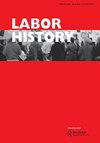中国工作场所个人和集体权利的演变
IF 0.7
4区 管理学
Q1 HISTORY
引用次数: 0
摘要
摘要由于有组织劳动的不发达性质,有可能将中国劳动立法中的“个人”和“集体”部分视为独立和可分割的。本文旨在挑战这种思维,认为中国的集体劳动法和集体谈判实践深刻地塑造了就业合同法和个人就业关系法。为此,分析有关个人劳动合同的法律不应不考虑集体劳动法。本文考察了1949年中华人民共和国成立后的前三十年,集体权利对就业权利法律规则的不发达和社会主义社会契约的产生的意义。本文还考察了1978年经济改革后,集体谈判以各种方式促成了从社会主义社会契约到标准劳动合同的转变,以及从不发达到全面的劳动立法框架的转变。最后,在后经济改革的几十年里,分析表明,集体谈判鼓励通过立法和行政努力赋予工会权力,并有助于将改善条款和条件纳入个人就业合同。本文章由计算机程序翻译,如有差异,请以英文原文为准。
The evolution of individual and collective rights in the Chinese workplace
ABSTRACT Due to the underdeveloped nature of organized labor, it is possible to view the ‘individual’ and ‘collective’ components of labor legislation in China as separate and severable. This article aims to challenge such thinking by arguing that collective labor law and collective bargaining practices in China have profoundly shaped the law of employment contracts and individual employment relations. To this end, analyzing the laws surrounding individual employment contracts should not proceed without considering collective labor law. This article investigates, in the first three decades following the establishment of the People’s Republic of China in 1949, the significance of collective rights to the underdevelopment of legal rules of employment rights and the emergence of the socialist social contract. This article also examines, after the economic reform of 1978, the various ways collective bargaining contributed to the transformation from the socialist social contract to the standard contract of employment and from an underdeveloped to a comprehensive framework of employment legislation. Finally, in the post-economic-reform decades, the analysis suggests that collective bargaining encourages the empowerment of trade unions with legislative and administrative efforts and facilitates the incorporation of terms and conditions improvement into individual employment contracts.
求助全文
通过发布文献求助,成功后即可免费获取论文全文。
去求助
来源期刊

Labor History
Multiple-
CiteScore
1.00
自引率
28.60%
发文量
44
期刊介绍:
Labor History is the pre-eminent journal for historical scholarship on labor. It is thoroughly ecumenical in its approach and showcases the work of labor historians, industrial relations scholars, labor economists, political scientists, sociologists, social movement theorists, business scholars and all others who write about labor issues. Labor History is also committed to geographical and chronological breadth. It publishes work on labor in the US and all other areas of the world. It is concerned with questions of labor in every time period, from the eighteenth century to contemporary events. Labor History provides a forum for all labor scholars, thus helping to bind together a large but fragmented area of study. By embracing all disciplines, time frames and locales, Labor History is the flagship journal of the entire field. All research articles published in the journal have undergone rigorous peer review, based on initial editor screening and refereeing by at least two anonymous referees.
 求助内容:
求助内容: 应助结果提醒方式:
应助结果提醒方式:


